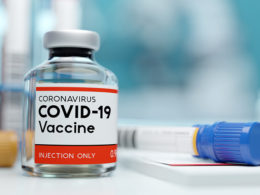Claim: According to a Twitter post, a person who takes a Covid-19 vaccine only builds immunity after about two weeks.
“Basically for the first two weeks after the first jab you are essentially unprotected. Thereafter, infection, illness and death drop off dramatically,” read the claim.
The user added that “ basically the first jab disables/ deactivates your immune system and the second one reactivates it.”
Contacted for a Comment, Health desk experts said COVID-19 vaccines tend to begin producing antibodies in people in as little as five days after being administered, but it usually takes a few weeks for the immune system to build up enough protection against the virus to be considered effective.
“Each of the vaccine types listed are given in two doses, several weeks apart. They will not reach their full level of effectiveness until a few weeks after the second shot,” said the experts.
“This means that immediately after the first vaccine dose, protection is not strong and is still being developed. That means it is possible for a person to become infected with the virus during this time.”
The experts said different types of vaccines work in different ways.
“So, we do not know exactly how much protection one may receive after one of the four vaccine types in Zimbabwe,” said the experts.
“We do know that a few weeks after receiving both shots, the risk of severe infections, hospitalizations, and death dramatically decreases amongst people who have been vaccinated.”
Meanwhile, the Health Desk experts added that the first doses usually generate immune responses to Covid-19, while the second doses reinforces those immune system reactions.
“After two shots of a Covid-19 vaccine immune responses tend to be stronger,” they said.
“There is no evidence to support claims that the Covid-19 vaccine disables or deactivate the immune system while the second reactivates the immune system.”
Background: To date, the government of Zimbabwe has approved the use of four Covid-19 vaccines, Sinopharm (from China), CoronaVac (from Sinovac in China), Covaxin (from Bharat Biotech in India) and Sputnik V (from the Gamaleya Research Institute in Russia).
The Covid-19 cases continue to rise in Zimbabwe on a daily basis.
The Health desk experts said roughly 3.9% of the country has been immunised, mostly due to a lack of global supply.
“With lockdown policies still in effect in some workplaces and quarantines for travelers arriving from certain regions, the government is hoping national stay-at-home measures will help prevent the spread of infections,” they said.
“Several factors are important to consider for preventing infections with the virus, including the low number of vaccines available, the period of time it takes for both vaccine doses to be given before the body reaches its highest level of protection, which populations will be prioritized during vaccine distribution, how many eligible people opt to take it, whether or not the government will extend the amount of time between the first and second doses, and whether or not booster shots will be needed and given for some vaccine types,” they said
“For this reason, vaccines are only a part of puzzle to stop Covid-19. More measures like frequent hand washing, social isolating, and wearing masks are excellent ways to stop the pandemic from impacting more people in the nation and abroad.”






